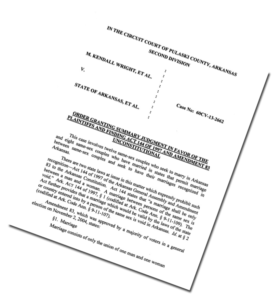Reflective Images
This project was funded by the Arkansas Community Foundation, supported through grants from the Alice L. Walton Foundation, Olivia and Tom Walton through the Walton Family Foundation, as well additional funds from the Winthrop Rockefeller Foundation.
All vignettes
Wright v. Arkansas is a vital piece of Arkansas’s civil rights history. The case represents the culmination of years of LGBTQ+ activism regarding marriage equality. This vignette is part of HumanitiesAR’s Reflective Images project and researched and written by Dr. Heather McNamee, BSE Program Director and Assistant Professor of History at Arkansas State University.
Introduction
Both state law and the Arkansas Constitution solidly prohibited legal marriages for LGBTQ+ citizens of Arkansas. In 1997, the General Assembly passed Act 144 that stated “a marriage shall be only between a man and woman. A marriage between persons of the same sex is void.” In 2004, a majority of the state’s voters approved Amendment 83 to the state constitution. Amendment 83 stated: “marriage consists of the union of only one man and one woman.” The amendment also added that “any legal status identical or similar to marital status shall not be recognized in Arkansas.” It provided an exception only for common law marriages of one man and woman from other states. Legally obtained same-sex marriages in other states would not be acknowledged in Arkansas.
In 2013, a group of more than forty LGBTQ+ citizens launched a lawsuit against the state claiming that the state law and constitutional amendment infringed on their due process and equal protection rights under the Fourteenth Amendment to the United States Constitution. The plaintiffs also contended that the law and amendment infringed on their rights as Arkansas state citizens. Section three of the Arkansas Constitution’s Declaration of Rights states “The equality of all persons before the law is recognized, and shall ever remain inviolate; nor shall any citizen ever be deprived of any right, privilege or immunity; nor exempted from any burden or duty, on account of race, color or previous condition.” The plaintiffs argued that marriage was a right being denied to them based on their sexual orientation. “These couples only want to exercise the exact same privileges everybody else in Arkansas has” Cheryl Maples, attorney for the LGBTQ+ couples, said.
 On May 9, 2014, Pulaski County Circuit Court Judge Chris Piazza ruled in favor of the LGBTQ+ couples. Citing legal precedents from the U.S. Supreme Court and other state courts concerning due process, equal protection, and marriage, Piazza ruled that Act 144 and Amendment 83 were unconstitutional. Piazza wrote, “Arkansas marriage laws discriminate against same-sex couples in violation of the Equal Protection Clause because they do not advance any conceivable legitimate state interest.” Although the state argued that procreation, child protection, and tradition were all-state interests in denying same-sex marriages, Piazza responded to each contention. “Procreation is not a prerequisite in Arkansas for a marriage license.” Regarding child protection, Piazza wrote: “the only effect the bans have on children is harming those of same-sex couples who are denied the protection and stability of parents who are legally married.” Finally, Piazza argued that tradition itself is not a rational basis for a law. “The fact that a particular discrimination is ‘traditional’ is even more of a reason to be skeptical of its rationality.” Citing the U.S. Supreme Court’s 1967 Loving v Virginia case that declared state interracial marriage bans unconstitutional, Piazza concluded his ruling: “It has been over forty years since Mildred Loving was given the right to marry the person of her choice. The hatred and fears have long since vanished and she and her husband lived full lives together; so it will be for the same-sex couples. It is time to let that beacon of freedom shine brighter on all our brothers and sisters. We will be stronger for it.”
On May 9, 2014, Pulaski County Circuit Court Judge Chris Piazza ruled in favor of the LGBTQ+ couples. Citing legal precedents from the U.S. Supreme Court and other state courts concerning due process, equal protection, and marriage, Piazza ruled that Act 144 and Amendment 83 were unconstitutional. Piazza wrote, “Arkansas marriage laws discriminate against same-sex couples in violation of the Equal Protection Clause because they do not advance any conceivable legitimate state interest.” Although the state argued that procreation, child protection, and tradition were all-state interests in denying same-sex marriages, Piazza responded to each contention. “Procreation is not a prerequisite in Arkansas for a marriage license.” Regarding child protection, Piazza wrote: “the only effect the bans have on children is harming those of same-sex couples who are denied the protection and stability of parents who are legally married.” Finally, Piazza argued that tradition itself is not a rational basis for a law. “The fact that a particular discrimination is ‘traditional’ is even more of a reason to be skeptical of its rationality.” Citing the U.S. Supreme Court’s 1967 Loving v Virginia case that declared state interracial marriage bans unconstitutional, Piazza concluded his ruling: “It has been over forty years since Mildred Loving was given the right to marry the person of her choice. The hatred and fears have long since vanished and she and her husband lived full lives together; so it will be for the same-sex couples. It is time to let that beacon of freedom shine brighter on all our brothers and sisters. We will be stronger for it.”
Piazza’s ruling created a state-wide frenzy. While the state promptly appealed the ruling, approximately 500 LGBTQ+ couples rushed to county courthouses to become legally married. On Saturday, May 10, 2014, Kristin Seaton and Jennifer Rambo became the first same-sex couple in Arkansas’s 178-year history to obtain a marriage license. For several days, some counties issued licenses to same-sex couples, but others awaited further guidance from the state. On May 16, the Arkansas Supreme Court issued a stay on the Piazza ruling. No additional marriage licenses could be issued to same-sex couples. LGBTQ+ couples who married during the six-day period were uncertain about the continued legal validity of their marriages. Others who wanted to get married but did not, remained uncertain about whether they would ever be able to. They remained in limbo for over a year.
For the remainder of 2014 and into 2015, the Arkansas Supreme Court was in what Arkansas Times editor Max Brantley called “a logjam.” Several situations including a fight to expedite the legal proceedings, contention over the issuance of a majority opinion, and the changing face of the Court due to a new appointment and election, all prompted several delays.
On June 26, 2015, the delays and confusion ended with the United States Supreme Court’s 5-4 decision in Obergefell v. Hodges. In the majority opinion, Justice Anthony Kennedy argued that the U.S. Constitution’s Fourteenth amendment protected marriage between same-sex couples just as it protects marriage for opposite-sex couples. Kennedy wrote: “The fundamental liberties protected by the Fourteenth Amendment’s Due Process Clause extend to certain personal choices central to individual dignity and autonomy, including intimate choices defining personal identity and beliefs.” Kennedy concluded the majority opinion: “In forming a marital union, two people become something greater than once they were. As some of the petitioners in these cases demonstrate, marriage embodies a love that may endure even past death…They ask for equal dignity in the eyes of the law. The Constitution grants them that right.”
The Obergefell case settled Wright v. Arkansas and the Arkansas Supreme Court had no further actions. Act 144 and Amendment 83 were unconstitutional. The nation’s highest court had said so. LGBTQ+ citizens in Arkansas promptly exercised their legal right to marry and continue to do so today.
Sources:
Bowden, Bill. “Arkansas Clerk Issues First Gay Marriage License,” Arkansas Democrat-Gazette web edition, May 10, 2014.
Carroll, Scott. “5 Counties Say No to Gay-Marriage Licenses, Many Will Wait for High Court Opinion After Judge Struck Down State Ban Friday,” Arkansas Democrat-Gazette web edition, May 12, 2014.


